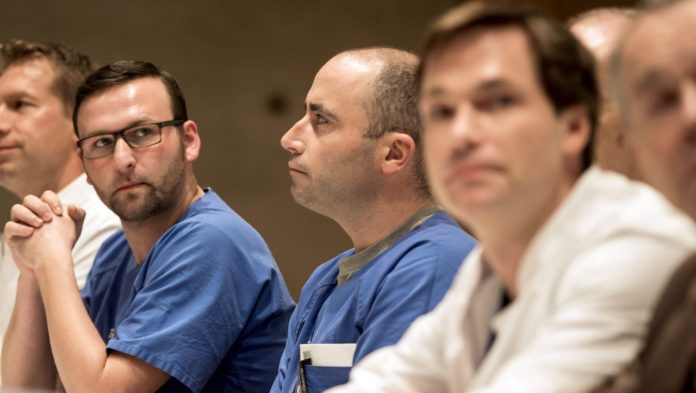
Above, a team of German doctors from Frankfurt University Hospital discuss the treatment of an Ebola patient with the experimental heart drug FX06 at a press conference this week.
A drug currently in development for heart attack patients may be a promising treatment for Ebola, scientists say.
A case study, published Thursday in the Lancet medical journal, provides details of one doctor’s successful treatment with the drug known as FX06. The 38-year-old doctor from Uganda contracted Ebola while working in Lakka, Sierra Leone in September.
After testing positive for the Ebola virus, the patient was flown to Frankfurt University Hospital in Germany for treatment. He was placed in intensive care in a level 4 biocontainment unit five days after he developed acute symptoms. The doctor is still unsure how he became infected, the article says.
Within 72 hours of arriving at the hospital, his condition got much worse and he developed hemorrhaging. As his lungs, kidneys and gastrointestinal tract showed signs of failing, the patient was given extensive supportive care, including dialysis and an antibiotic to prevent any subsequent infections, as well as fluid IVs to prevent dehydration, a common and often deadly side effect of the virus.
Doctors also gave him a 3-day course of FX06, an experimental drug designed to treat vascular leakage, or loss of fluid from the blood vessels, to prevent further damage in cardiac patients after a heart attack. FX06 is made using a natural human blood-clotting protein called fibrin.
The drug works by sealing the walls of blood vessels, which are thinned out when the Ebola virus begins to attack the body. This is what causes the hemorrhaging that occurs in patients with advanced Ebola infections. According to the authors, the drug has been shown to stop vascular leakage in mice with Dengue hemorrhagic fever, a virus in the same family as Ebola.
After receiving the drug, the patient showed “marked improvement in vascular and respiratory function,” the article says.
“Despite the development of vascular leak syndrome and a consecutive multiorgan failure, we managed to support the patient until the development of a potent, adaptive immune response could effectively control the infection,” the authors write in the paper.
Thirty days after he first started showing symptoms, doctors determined he was Ebola free and discharged him from the hospital.
More rigorous trials needed
Although the authors are hopeful about the findings, they stress that it’s still unclear what role FX06 played in the patient’s recovery, or whether the quality supportive care he received was the main factor that helped him survive. The paper notes that a second Ebola patient who was also given FX06 did not survive.
The authors conclude by citing the need for further research on the new drug, writing:
In view of the urgency for action in light of the current epidemic, where validated therapies are desperately needed, the efficacy of FX06 should soon be assessed in clinical trials or at least by standardized collection of data from patients with Ebola virus disease who received it in a compassionate use setting.
The case highlights a main challenge when it comes to assessing the effectiveness of any potential treatment for Ebola. The experimental serum ZMapp, which was given to a number of infected health care workers before supplies ran out, appeared to help most of them recover. However, like the doctor who received FX06, they also had the benefit of being hospitalized at sophisticated medical facilities equipped to handle patients with life-threatening, infectious diseases, so the impact of the serum alone was not clear.
Case studies of a number of patients treated in Europe and the U.S. have shown that providing the right supportive care can mean the difference between life and death for an Ebola patient. Fluid IVs, dialysis, oxygen, anti-diarrheal and anti-vomiting medications all help to keep a patient stable, allowing them to survive long enough to fight off the infection on their own.
Doctors have also used antibody-rich blood products from Ebola survivors — called convalescent serum — to successfully treat several patients with the virus, but again, scientists say it’s impossible to know what really works without trials in large numbers of people, because one patient may recover for reasons unrelated to any one specific treatment.
